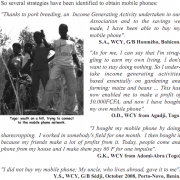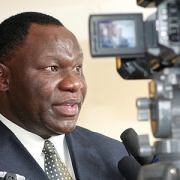Mobile phones to lead a revolution in sub-Saharan Africa?
Social-media-driven Arab Spring uprisings brought an end to long-standing dictatorial regimes. If the movement is to spread south of the Sahara, it will be triggered by mobile phones.
A recent report by the GSM Association (GSMA), a global group representing the interests of mobile operators, claims that Africa is now the fastest growing mobile market and the second largest in the world with over 620 million mobile connections as of September, a figure expected to reach 735 million by the end of 2012.
“The mobile industry in Africa is booming and a catalyst for immense growth, but there is scope for far greater development,” said Peter Lyons, Director of Spectrum Policy, Africa and Middle East, GSMA.
The booming mobile industry is not only contributing to overall economic development but it is also empowering citizens.
For instance, the GSMA report estimates that the mobile ecosystem employs over 5 million Africans and contributes US$56bn to the regional economy, equivalent to 3.5% of total GDP.
Through m-Agri applications, farmers are able to access vital agricultural information, training, and advice on pests, diseases, weather, fertilizers, and best farming practices. According to the International Food Policy Research Institute, 65% of the population on the continent relies on subsistence farming. This underlines how crucial mobile connectivity can be to the livelihoods of most Africans.
Community Health Workers (CHWs) in UN’s Millennium Villages in Uganda, Rwanda, and Kenya receive professional training through m-Learning modules accessible on their mobile phones. CHWs do not have to travel in urban areas where they would have to pay exorbitant fees for an education.
Mobile technology is changing the way healthcare is delivered on the continent. In Rwanda, m-Health applications enable health workers in the field to use mobile phones in data collection related to outbreak of contagious diseases, for instance, and report the information in real time.
In Kenya, mobile phones have made money transfer as quickly and as easily as sending a text message. The most successful m-Banking initiative, and the first to operate on a large scale is, M-Pesa, a joint venture between mobile phone giant Vodafone and Kenya’s Safaricom. The M stands for mobile, and Pesa is Swahili for money.
The report credits market liberalization policies, foreign direct investment, rollout of mobile network infrastructure, affordability of mobile phones, and substantial regional economic growth for the mobile industry boom.
It is clear that a digital revolution is already underway and as mobile phones promotes information exchange within and among nations, and continue to empower citizens in the process, African will demand more from their leaders. That is a good enough reason to hope for revolutionary changes towards democratic governance.







































